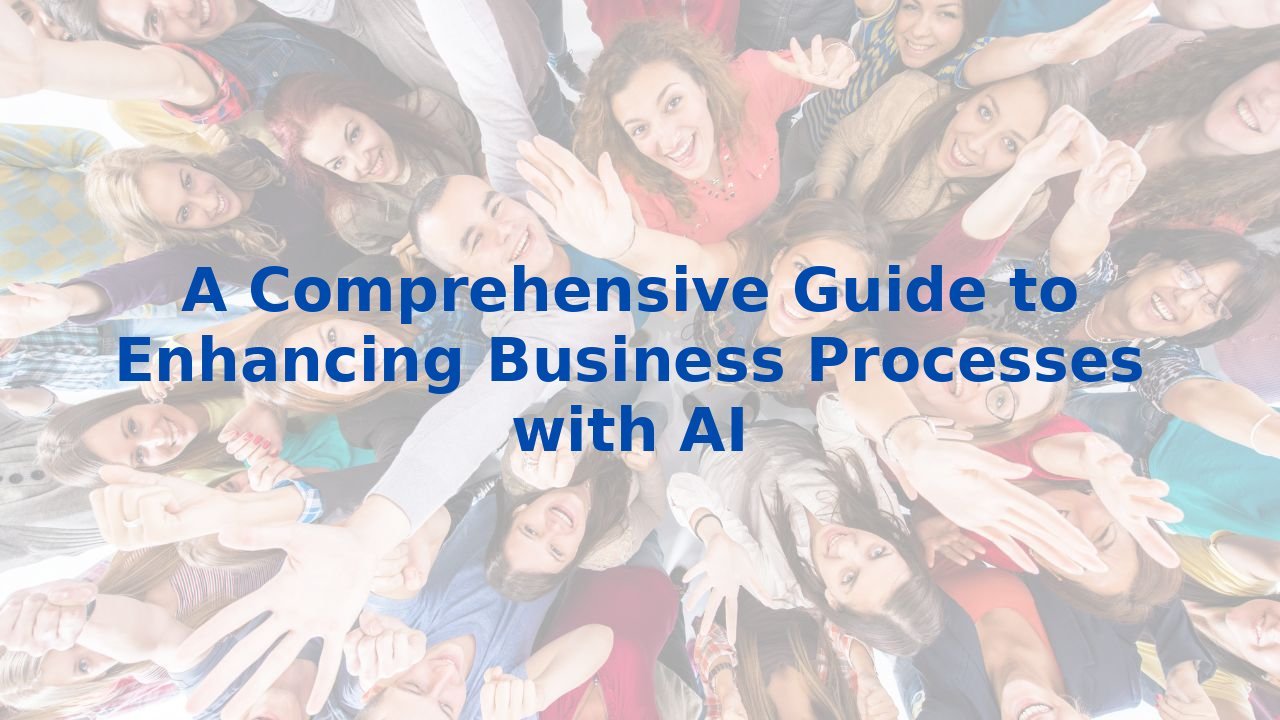A Comprehensive Guide to Enhancing Business Processes with AI
A Comprehensive Guide to Enhancing Business Processes with AI
In an age defined by rapid transformation, businesses are continually on the lookout for innovative ways to enhance their operations and decision-making capabilities. Artificial Intelligence (AI) stands out as a beacon of opportunity, with the potential to revolutionize various business processes. In this guide, we will explore how AI can enhance general business processes, emphasizing the tangible benefits it brings in terms of efficiency and productivity.
1. Process Discovery and Optimization
One of the most pivotal aspects of AI in business is its ability to uncover inefficiencies hidden within current processes. By leveraging process mining, AI can sift through massive amounts of operational data, identifying patterns and workflows that often slip under the radar in human oversight. This initial phase is paramount for organizations aiming to optimize their operations, as it highlights bottlenecks and redundancies that, once addressed, can unlock significant efficiency gains.
2. Process Mapping and Automation
Following process discovery, AI seamlessly aids in creating detailed process maps using machine learning and advanced data analytics. These visuals shed light on how various processes interconnect while pinpointing inefficiencies within workflows. Moreover, AI-powered robotic process automation (RPA) takes this a step further by assuming the role of executing repetitive, rule-based tasks. This shift allows human employees to redirect their focus towards more strategic and creative endeavors, fostering an environment of growth and innovation.
3. Decision Support and Predictive Analytics
In the realm of decision-making, AI acts as a crucial ally, offering robust support for complex processes. By analyzing both structured and unstructured data from a myriad of sources, AI enables organizations to extract actionable insights and simulate different scenarios. The power of predictive analytics allows businesses to forecast potential outcomes, empowering them to make proactive and informed decisions based on historical trends and data patterns.
4. Customer Service Enhancement
The transformation of customer service through AI is nothing short of remarkable. Routine inquiries can now be handled swiftly via AI-driven chatbots, which enhance response times and ensure that customers feel valued. Furthermore, AI's capability to analyze customer feedback leads to continuous improvements in service delivery. By automating mundane tasks and streamlining communication, organizations can create a more personalized and efficient customer experience.
5. Product Development and Content Generation
AI's influence extends into product development as well, utilizing generative design to explore a multitude of design variations rapidly. This technology accelerates the prototyping process, helping teams identify the most viable designs while reducing the expense of extensive iterations. Additionally, AI-driven content generation tools can craft engaging text, from product descriptions to insightful industry articles—all at an impressive pace, which empowers marketers and content creators to focus on high-level strategies rather than repetitive writing tasks.
6. HR and Recruitment
In the realm of Human Resources, AI is making significant strides by enhancing recruitment processes. Automated assessments streamline the initial stages of candidate evaluation, freeing HR professionals to engage in meaningful interactions with promising talent. AI's ability to analyze diverse data points enables companies to make fair and competitive salary offers based on intricate market trends, fostering a more equitable workplace.
Benefits of Training Employees for AI
While AI offers remarkable capabilities, its true potential flourishes when paired with a workforce equipped with the right skills. Training employees in AI arms them with a deeper understanding of AI-driven processes, enabling them to effectively engage with these technologies in their daily tasks. Several benefits emerge from investing in such training:
- Enhanced Understanding: Employees grasp the functionality of AI and its integration into workflows.
- Effective Tool Operation: Training ensures proficiency in AI tools, maximizing efficiency.
- Informed Decision-Making: Employees leverage AI insights to drive better outcomes.
- Adaptive Change Management: Continuous training fosters agility, allowing teams to adapt to ongoing technological advancements.
Conclusion
Artificial Intelligence is not merely a buzzword—it's a transformative force that is reshaping business processes across industries. From optimizing processes and enhancing decision-making to revolutionizing customer service and HR operations, the applications of AI are vast and profound. By embracing AI technologies and prioritizing employee training, businesses can not only improve their operational efficiency but also carve out a competitive edge in an ever-evolving marketplace.
To explore how your organization can enhance its operations with AI, consider investing in comprehensive training solutions designed to equip your entire workforce with the necessary skills. Complete AI Training offers tailored training programs that cater to diverse business needs, ensuring your team is poised to thrive in the age of AI.



